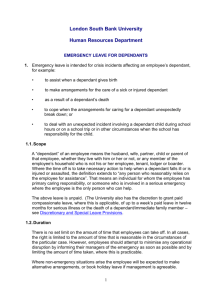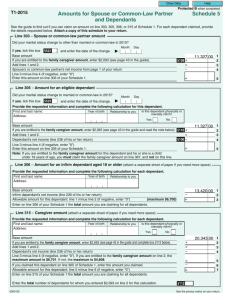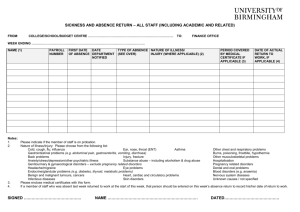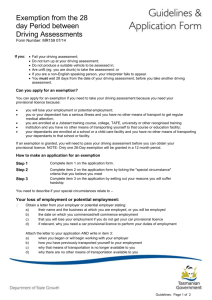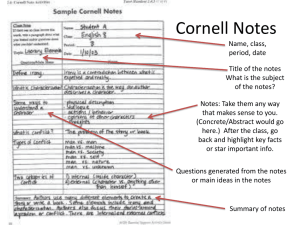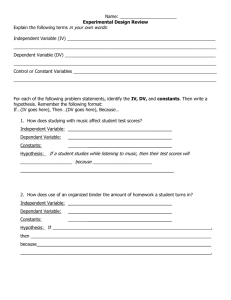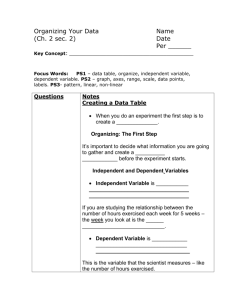Emergency Dependents Leave Policy NEW - Heriot
advertisement
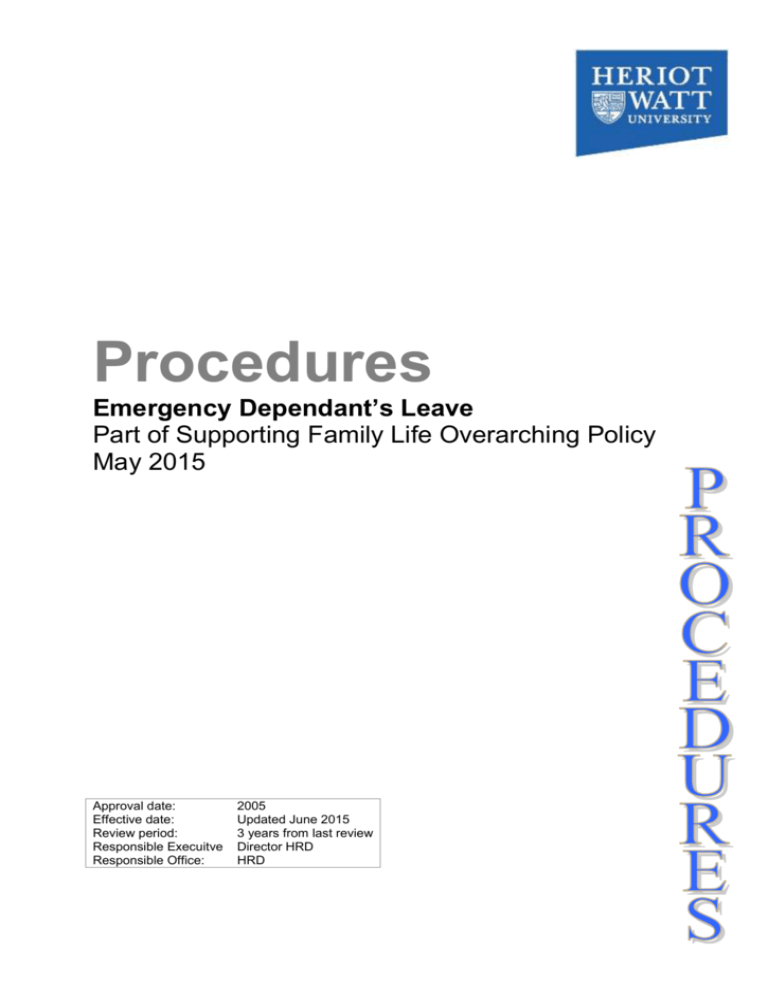
Procedures Emergency Dependant’s Leave Part of Supporting Family Life Overarching Policy May 2015 Approval date: Effective date: Review period: Responsible Execuitve Responsible Office: 2005 Updated June 2015 3 years from last review Director HRD HRD Heriot-Watt University’s Emergency Dependant Procedures (part of Supporting Family Life Overarching Policy) CONTENT Section Page 1 Introduction 3 2 Eligibility 3 3 Entitlement 3 4 Procedure 4 5 Where to find help and advice 5 6 Procedures Version and History 5 Version 6.0 : May 2015 Author: HR H Hymers URL 2 Heriot-Watt University’s Emergency Dependant Procedures (part of Supporting Family Life Overarching Policy) 1. INTRODUCTION Heriot-Watt University is committed to providing to creating and maintaining a supportive environment which promotes equality of opportunity across our University Community. We recognise that our colleagues have busy and varied lives both at work and out of work and wish to encourage and support colleagues who are, or who wish to become, parents or carers, to balance their home and work commitments without detriment to either; and to support career development for everyone who seeks to progress. This Procedure, which is part of the proposed Supporting Family Life suite of procedures, recognises the right for employees to take a reasonable amount of unpaid time off work to deal with unexpected or sudden emergencies involving a dependant and to make any necessary longer term arrangements, as set out in the Employment Relations Act 1999. 2. ELIGIBILITY This policy applies to all categories of University staff and includes full-time, part-time, permanent and fixed-term employees. A ‘dependant’ is the husband, wife, civil partner, partner, child or parent of the employee. It also includes someone who lives in the same household as the employee. For example, this could be an elderly aunt or grandparent who lives in the household. It does not include tenants or boarders living in the family home, or someone who lives in the household as an employee, such as a live-in housekeeper. In cases of illness or injury, or where care arrangements break down, a dependant may also be someone who reasonably relies on the employee for assistance. This may be where the employee is the primary carer or is the only person who can help in an emergency; for example, an aunt who lives nearby who the employee looks after outside work falls ill unexpectedly, or an elderly neighbour living alone who falls and breaks a leg, where the employee is closest on hand at the time of the fall. 3. ENTITLEMENT The amount of time off that the employee is entitled to will vary according to the circumstances of the particular emergency. It may be for a small proportion of the working day or for the whole day. In most cases, the amount of time off will not exceed one or two days. Employees have the opportunity to make the time up later or to use some of their annual leave. If the employee has already previously worked in excess of their contracted hours without being paid then it would be reasonable to allow them the time off. Line managers should use their discretion and common sense in these situations. If none of the options outlined are possible then the time off to deal with the emergency is unpaid. Typical circumstances that may result in the employee exercising this right within the terms of this policy may include situations where the employee has to deal with: Unexpected disruption or breakdown of care arrangements for a dependent, (for example, the nurse who comes to take care of an elderly relative fails to turn up as arranged) A dependant who has fallen ill, is injured or assaulted (for example, the employee’s child is injured while at school or in after school care) A dependant who has gone into labour Version 6.0 : May 2015 Author: HR H Hymers URL 3 Heriot-Watt University’s Emergency Dependant Procedures (part of Supporting Family Life Overarching Policy) This list is not exhaustive. The time off to which the employee is entitled is as much time as is necessary to allow the employee to deal with the immediate emergency and to make any necessary longer term arrangements for the dependant’s care. If the employee becomes part of that arrangement for longer term care then they should use some of their annual leave entitlement. For example, if an employee’s child falls ill then the employee is entitled to take emergency leave to allow them time to take the sick child to stay with relatives. However, if the employee decides instead to care for the child themselves then they should take annual leave in agreement with their line manager. Other University Procedures also have provision for leave to care for dependants in non-emergency situations. For example, 4. if an employee’s partner suddenly goes into labour then the employee is entitled to emergency leave under the terms of this policy. However, time off after the birth to care for the child is covered by the University’s Paternity Leave Procedure. if an employee’s dependant takes ill and/or is injured then the employee is entitled to take emergency leave under the terms of this policy. If the dependant subsequently dies, then the employee is entitled to take paid Bereavement Leave. The precise amount of paid leave is at the discretion of line managers although university guidelines suggest 3-5 days for a close relative/friend. PROCEDURE Line managers should exercise sensitivity and common sense in responding to employees who find themselves in a position where they are having to deal with an unexpected emergency situation that may be distressing for them and their dependant. If the emergency occurs before the start of the working day then the employee should, where possible, advise their line manager before 10:00 a.m. or two hours prior to the commencement of shift (in line with the normal procedures for notification of absence). However, by definition this policy applies to circumstances which are unforeseen and can happen at any time; therefore the requirement is that employees notify their line manager as soon as is reasonably practicable of the reason for their absence and how long they expect to be away from work. This means that if the emergency occurs while the employee is attending work then wherever possible the employee should notify their line manager before leaving the workplace. If the specific circumstances of the emergency leads to the employee returning to work before it were possible for them to contact their line manager, then they must tell their line manager the reason for their absence immediately upon their return to work. During the period of absence, if circumstances should change, for example, if the employee now realises that they are not going to be able to return to work when they originally intimated then they should make contact with their line manager to update them on their situation. Version 6.0 : May 2015 Author: HR H Hymers URL 4 Heriot-Watt University’s Emergency Dependant Procedures (part of Supporting Family Life Overarching Policy) 4.1 Recording the Absence If the time is to be made up There will be no need to record the absence on iHR but the manager and employee should agree the work pattern between them. If annual leave entitlement is being used The normal process for booking and approving annual leave should be followed. If the leave is to be taken as unpaid leave The manager should record the absence on iHR as “Unpaid Leave” with the absence category as “Emergency Leave”. The University reserves the right to monitor the allocation of leave for each employee under the terms of this policy. 4.2 Abuse of this right An example of this may be where an employee claims that there is an emergency situation with a dependant and takes emergency leave but this turns out to be completely untrue. Another example would be where the situation was, from the very outset, obviously not an emergency and could have been dealt with out of working hours without the employee taking time away from work. Once again, common sense and sensitivity on the part of the line manager is required in dealing with such situations but any employee found to be deliberately abusing the right to take emergency leave from work may be subject to disciplinary action. 5. FURTHER HELP AND ADVICE Human Resources – http://www.hw.ac.uk/hr/su_list_hr_staff.php - for queries regarding this and other linked Procedures. iHR Sharepoint site – please login here for guidance on how to record absences 6. POLICY VERSION AND HISTORY Version No Date of Approval V. 6.0 08.06.2015 Version 6.0 : May 2015 Author: HR H Hymers URL Approving Authority or responsible officer, as appropriate Director of Human Resources Development Brief Description of Amendment Revised to include iHR reporting and to form part of new Supporting Family Life Overarching Policy 5
